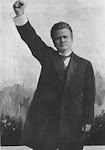Rob goes on to discuss his concerns if the water utility was ever privatized. But following the links regarding Chicago's parking problems brings one to the original column in the Chicago Sun Times which really raises some interest points:Chicagoans are rebelling against the incredibly high parking meter increases since the city leased the parking operations to Morgan Stanley. People are painting over the meter windows, ripping them out of the cement and removing the stickers that are legally required on each meter in order for Chicago Parking Meters, LLC (a/k/a Morgan Stanley) to charge 28 quarters for an hour of parking. Here, some people are bent out of shape over a $.50/hour increase; I can only imagine the “tea party” the suburban shoppers in the Third Ward would throw if we did what Chicago is doing.
What Chicago’s parking snafu shows is that not all privatization is going to lower our costs, as some privatization supporters proclaim in their quest to remove as many services from the government payroll as possible. When an entity is in place to serve the community good, it puts people ahead of profits.
What's up is that a month ago, when the City of Chicago privatized parking meters, rates were immediately jacked way up, and you now have to feed 28 quarters into the meter to park a car in the Loop for two hours. In exchange for a 75-year lease, the city got $1.2 billion to help plug its budget holes.
But by handing over municipal parking meters to a private company, the city has given its citizens a colossal case of sticker shock. The cost of most meters will quadruple by 2013.
The deal Mayor Daley rammed through a pliable City Council in 48 hours allows the company to keep all revenue from the meters while the city keeps all cash from parking tickets when meters expire.
But wait. Don't parking tickets reap six, seven, even eight times more than what meters bring in? If people start refusing to park at meters, how can they get ticketed? And how can the city hope to rake in that revenue?
It's kind of interesting on how the privatization plans offered by politicians, and generally favored by conservatives, aren't much more than another version of corporate welfare, which usually costs taxpayers more than what the promised savings were.
Now, those familiar with me know I am no fan of privatization, or to be more accurate, profiteering. I've regularly pointed out how the privatization of the Milwaukee child welfare system has cost more money, and sticking us with a system than the one we had.
This talk of privatization, elected leaders looking to shore up their budgets with a quick fix and the unintended consequences of privatization also brings to mind that Milwaukee County Executive Scott Walker is again flying the idea of privatizing the airport. I was against the idea when Walker first brought it up, and those feelings are only stronger at seeing what the probable effects are going to be.
As County Supervisor Johnny Thomas pointed out, privatizing the airport will raise the costs to the airlines that come here, and they will in turn raise the costs of their fares for air travelers.
The private company would also raise the rent on the stores, restaurants and bars in the airport, thereby raising their costs as well. Parking rates would also go through the roof.
To me, the people that should be really alarmed by Walker's proposal are the citizens that live near the airport. I have heard discussions before about the desire to expand the airport's capacity, which would mean adding more strips. We have repeatedly seen how easy it is for governments and large companies to snatch up properties, even if the owner isn't willing to sell their homes. I could see large numbers of people being evicted from their homes so that the private agency running the airport could expand their capacity, and thereby increasing their all-important profit margins.
The sad part is that most of the budget crisis could have been avoided if Walker had been more interested in solving the county's problems instead of how he could use them to launch his perpetual gubernatorial campaign.














Of course Walker became the king of privatization by leading a prison building binge during the 1990's in Wisconsin, something we are paying for big time today.
ReplyDeleteThe notion that 'cost' is just what you feed the meter is a little short-sighted don't you think?
ReplyDeleteIsn't there a cost to driving around looking for an open meter? If the higher rates discourage downtown parking won't those costs be reduced?
Couldn't higher meter rates lead to increased carpooling and then to reduced greenhouse gas emissions? Wouldn't this lower the costs associated with global warming?
Costs can be real even though they don't require you to shell out a coin or two, or twenty eight, every hour.
No doubt there is a reasonable discussion that can be had about just where the limit of privatization should be, but parking meters seem like a no-brainer.
The parking meter is just one example of the misleading nature of privatization, and your points are valid. However, people tend to not look at long range things or abstract notions as much as how they will be affected immediately and personally.
ReplyDeleteBut, as in my example with the airport, what looks like it might save someone $10 or $20 on their taxes could cost them their house.